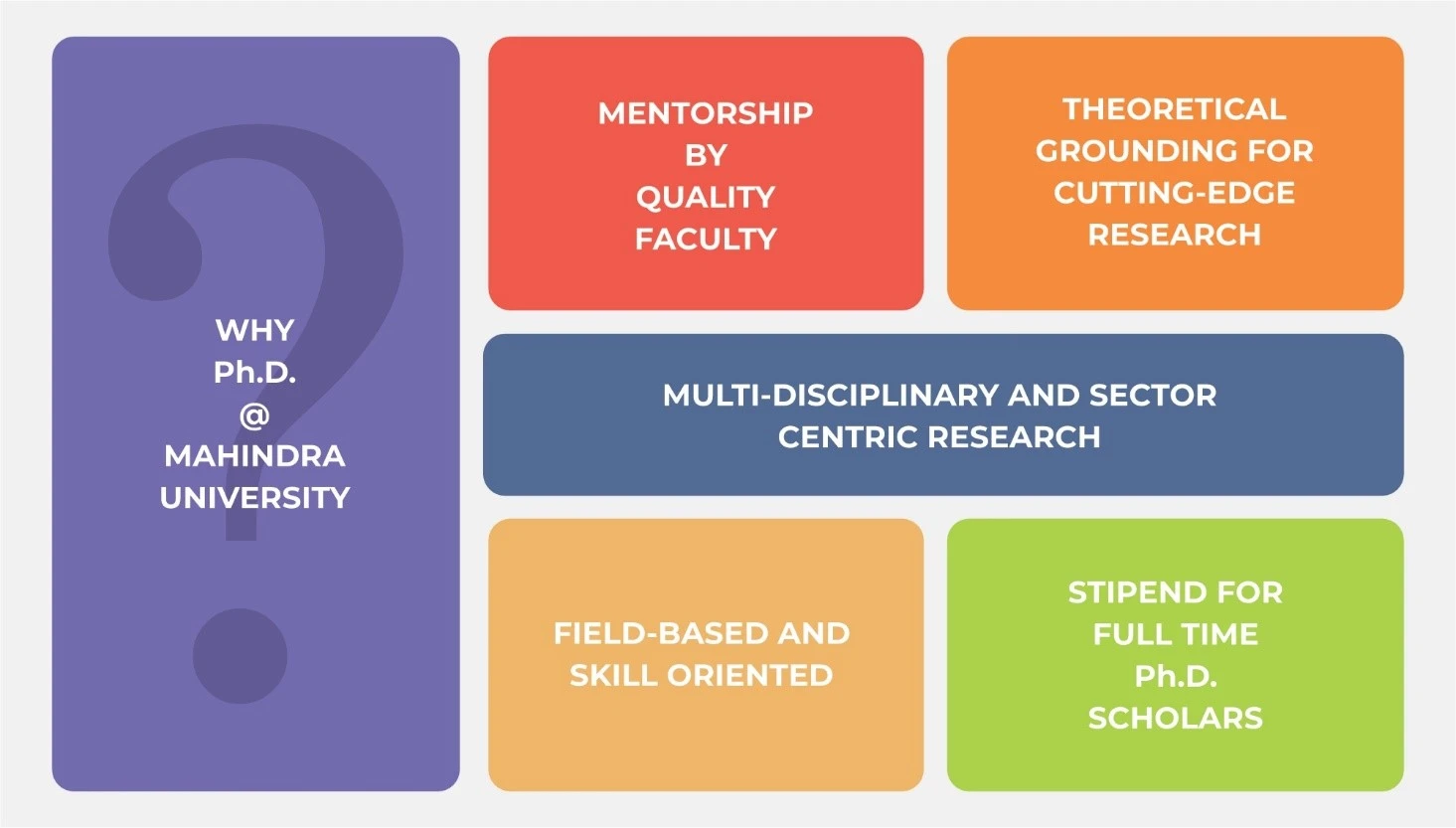Ph.D. in
Educational Studies
Overview
Indira Mahindra School of Education (IMSE) has been offering Ph.D. programme in Educational Studies since its inception in 2021. The programme is a suitable opportunity for students interested in pursuing their passion in research in Education and to join the next generation of professionals and thought leaders in Education.
Mahindra University, notified by the Government of Telangana vide Telangana Ordinance No. 1 of 2020 dated 20th May 2020, announces the launch of its 2nd Batch of Ph.D. admissions in the Semester starting in Aug, 2023.
The Doctor of Philosophy (Ph.D.) degree is acknowledged to be the highest university degree that is conferred on a doctoral student, who successfully defends her/his Ph.D. thesis in front of a panel of experts in the field appointed by the University after having spent a stipulated time and having achieved publications in reputed international journals and conferences.
The first year would require the Ph.D. candidate to go through a set of prescribed course work followed by initiation to research and comprehensive examination and carrying out actual research with the Ph.D. Adviser. The journey to earning Ph.D. degree typically goes through a cycle of four phases involving preparation, challenges, small and big successes and ultimate joy of successful defense of the written thesis. Completion of a thesis, depending on individual performance, typically may take about 3 years, and may be extendable to the fourth year depending on the careful consideration of individual cases of students.
The Mahindra Edge
Indira Mahindra School of Education (IMSE) has the advantage of being located in a multi-disciplinary, diverse and a vibrant residential campus environment. Ph.D. students at Mahindra University would have great opportunities for interdisciplinary learning by working closely with our faculty, some of whom are at the forefront of their fields (may like to check faculty profiles on our website).
Ph.D. in Educational Studies
The IMSE has been offering Ph.D. programme in Educational Studies since its inception. The Programme would open up windows of opportunities in the development sector, teaching, research, consultancies and education policy think-tanks. The School is committed to build proper foundation for professional development and personal growth of aspiring students interested in education. The research opportunity at IMSE is open to all those post-graduates who have evidence of interest in Educational Studies. The School offers specializations rooted in multi-disciplinary training and sectoral peculiarities within the field of Education.
Admission Process:
Admission will be a two-stage process.
- In the first stage, applicants will be shortlisted based on their past academic credentials and their research proposals. Students are required to submit a research proposal (max. 1500 words) in their chosen area of research along with application form.
- In the second stage, shortlisted candidates will be called for an interview by the faculty.
Overview
IMSE started with a Doctoral program in Educational Studies in 2021. The School has fifteen Ph.D. students (six confirmed and nine undergoing their course work) enrolled at present. IMSE’s doctoral program trains students to be rigorous, focused and committed researchers and encourages them to pursue research in an area of their choice. School encourages the students to work on problems that are unique and relevant to deepen the understanding in the field of Educational Studies. The Ph.D. program invites and engages students from multi-disciplinary backgrounds and encourages them to go beyond the path that is usual and taken for granted.
The intellectual climate of the School is open, collaborative and curiosity-driven. A short time after our official start, the School has been organising fortnightly lectures in which prominent Scholars from across the globe have shared their work. The School also has a series of ‘work-in-progress’ seminars by doctoral students who are pursuing their Ph.Ds in different universities in the country. These exchanges have been very useful.
IMSE started with a Doctoral program in Educational Studies in 2021. The School has fifteen Ph.D. students (six confirmed and nine undergoing their course work) enrolled at present. IMSE’s doctoral program trains students to be rigorous, focused and committed researchers and encourages them to pursue research in an area of their choice. School encourages the students to work on problems that are unique and relevant to deepen the understanding in the field of Educational Studies. The Ph.D. program invites and engages students from multi-disciplinary backgrounds and encourages them to go beyond the path that is usual and taken for granted.
The intellectual climate of the School is open, collaborative and curiosity-driven. A short time after our official start, the School has been organising fortnightly lectures in which prominent Scholars from across the globe have shared their work. The School also has a series of ‘work-in-progress’ seminars by doctoral students who are pursuing their Ph.Ds in different universities in the country. These exchanges have been very useful.
Specialized areas in which Ph.D. students, if found suitable, would be admitted in Fall 2025 Semester starting in August
| Areas | Qualifications Required (A Minimum of 55% of marks in respective qualifying degree is essential) |
|---|---|
| 1. Mathematics Curriculum and Pedagogy | M.Ed. (with the specialization in pedagogy of Mathematics); M.Sc. Mathematics; M.A. Education (with specialization in pedagogy of Mathematics) |
| 2. Diversity, Equity and School Cultures | MA in Education, M Ed MA in Sociology |
| 3. Economics of Ed Tech, Educational Technology and Information | MA in Economics or Development Studies or Labour Economics; MA Education |
| 4. History of Educational Institutions | MA in History |
| 5. Vocational and Skill-based Education | MA in any social science / humanities with a keen interest in technical education, employment and work. |
| 6. Vulnerability and Psychological Resilience in educational contexts | MA or MSc in Psychology or Applied Psychology; M.Ed.; MA Education |
Important Dates
| Last Date for submission of applications | 4th June, 2025 |
| Shortlisting of candidates for interview | 9th June, 2025 |
| Ph.D. Entrance Test / Interview | 14th Jun, 2025 |
| Announcement of Results | 30th Jun, 2025 |
| Commencement of the Fall 2025 Semester Teaching | 4th Aug,2025 |
The Mahindra
Edge
Ph.D. students at Mahindra University would have great opportunities for interdisciplinary research by working closely with our faculty, some of whom are at the forefront of their fields (may like to check faculty profiles on our website).

Eligibility Criteria
Essential :
Post-Graduate Degree in any discipline, preferably in Education (MA or M.Ed.) or in any of the social sciences (MA in Economics, History, Psychology, Sociology, Political Science) from any recognized university with a minimum of 55% marks.
Desirable:
INR 50,000/-
PER ANNUM
INR 20,000/-
SECURITY DEPOSIT
(ONE TIME PAYMENT)
Ph.D Assistantship
(for full time scholars)
INR 30000/- Per Month* ( plus Boarding and Lodging )
*8 hours/week TA duty is mandatory
Course Structure
The Course structure for Ph.D. in Educational Studies consists of six core courses (mandatory), one compulsory skill-based module on Academic Writing, one compulsory audit module course on Understanding Educational Data and three baskets of elective courses including the seminar course. In the first/Fall semester, students are offered three core courses and one compulsory skill-based module along with one compulsory audit course. One of the core courses to be opted by the students will be in a Major disciplinary area (4 credits) that the student wishes to specialise. Currently, the School offers choices in the disciplines and fields of (i) Education, (ii) Economics of Education, (iii) Sociology of Education, (iv) History of Education and (v) Psychology of Education. Students are required to choose one of these five courses depending on their previous training/interest/choice for specialization. Except the course on Major Disciplinary areas all other courses will be of 2 credits.
In the second/Spring semester, students are offered two core courses and will be required to choose two elective courses from three baskets. The core courses would comprise of (i) Research Methods-II and (ii) Research and Publication Ethics. Students will be allowed to choose two electives in the second semester from three baskets. They will be allowed to choose any two baskets out of the three and one course each from the (two) chosen baskets. One basket of elective courses comprises of thematic courses, second on seminar course and the third one consists of advanced research methods. All courses in the second semester will be of 2 credits.
The seminar courses will be co-constructed during the progress of the course depending on the interest of the students.
Course Structure: An Overview
| Academic Year | Semester | Core Courses | Electives | Skill-based modules | No. Of credits |
|---|---|---|---|---|---|
| First Year | Sem 1 | CC-1 (2 credits) CC-2 (2 credits) CC-3 (4 credits) |
SB-1 (mandatory) 2 credits |
10 | |
| Sem 2 | CC-4 (2 credits) CC-5 (2 credits) |
EC-1 (2 credits) EC-2 (2 credits) |
08 | ||
| Next Year | Sem 3 | Comprehensive Examination/Confirmation of PhD Candidacy | —- | ||
| Sem 4- Sem 6 |
Thesis | —- | |||
| Total credits | 18 | ||||
Course Details
| Core/Compulsory | Electives (2 credits) | Module/Skill based | |
|---|---|---|---|
| Sem I (3 Core, 1 Compulsory Module and 1 Compulsory Audit Module) 10 credits |
1. Research Methods- I(2 Credits) 2. Education in India (2 Credits) 3. Major Disciplinary Area (4 Credits)-any one of the following: a. Education b. Psychology of Education c. Sociology of Education d. History of Education e. Economics of Education |
1. An Introduction to Academic Writing (2 credits, compulsory) 2. Understanding Educational data (Compulsory Audit) |
|
| Sem II (2 core, 2 Electives) 08 credits |
1. Research Methods- II (2 Credits) 2. Research and Publication Ethics (2 Credits) |
Two baskets out of the Three Elective I (Select one out of the following) (2 Credits) 1. Educational Leadership and Governance 2. Education and Diversity in Multicultural Societies 3. Mathematics Education Research 4. School Education 5. Education Policy: Economic perspectives 6. Understanding the Relationship between Education and Work Elective II (Select one out of the following) (2 Credits) 10. Advanced Quantitative Research methods 11. Historiography and Methods in History 12. Advanced Qualitative Research Methods Elective III (Seminar Course) (2 Credits) |
|
| Sem III | Comprehensive Examination/Confirmation of PhD Candidacy | ||
| Sem IV- Sem VI | Thesis | ||
| Total Credits to be earned: 18 | |||









